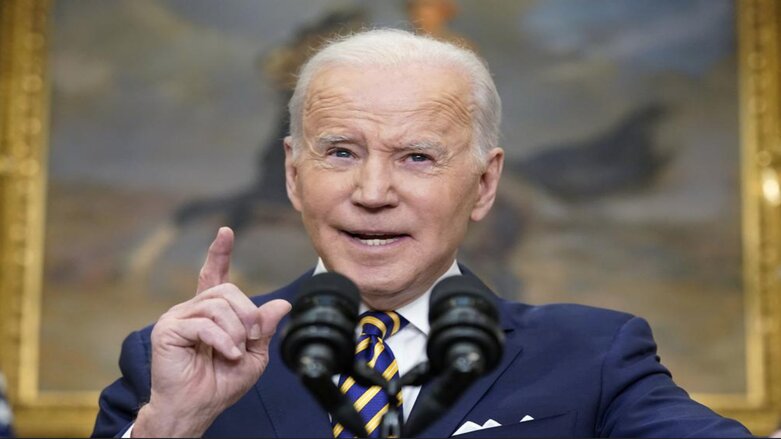US bans Russian energy imports; Europe follows in part; but Saudi, UAE reject US overtures

WASHINGTON DC (Kurdistan 24) – As Moscow's offensive in Ukraine continued into its 12th day, US President Joe Biden announced on Tuesday that he was prohibiting the import of all energy products from Russia.
The US, a major oil producer itself, is much less dependent on energy imports from Russia than Europe. The US imports only 700,000 barrels of oil per day from Russia, while Europe gets 40% of its natural gas from Russia.
The Biden administration is, nonetheless, acting in concert with its allies. It has adopted the attitude that each party should do what it can, and they have announced similar but lesser measures.
Thus, on Tuesday, Britain announced that it would end all Russian oil imports by the end of 2022, while the European Union said it would cut Russian gas imports by two-thirds over the course of this year—although some analysts have raised questions about whether the EU will really be able to achieve the goal it has announced.
Such measures are made possible by the unexpectedly stiff resistance to the Russian invasion raised by the Ukrainians. As CIA Director William Burns told the US Congress on Tuesday, Russian President Vladimir Putin had planned on seizing Kiev within two days.
Tuesday's announcements follow a Russian threat on Monday. In a televised address, Deputy Prime Minister Alexander Novak warned that if the western countries proceeded with their bans on Russian energy, Moscow would cut off its export of natural gas to Europe through the Nord Stream pipeline.
The moves in the West and Russia's countermoves, thus, "would lead to catastrophic consequences for the global market," Novak warned. "The surge in prices would be unpredictable. It would be $300 per barrel, if not more."
Energy prices have risen significantly since Moscow's assault on Ukraine began, and they will continue to do so. As part of Washington's effort to counter the price rise, it has approached major oil producers, like Saudi Arabia and the United Arab Emirates.
However, the leaders of both countries have refused to speak with Biden, primarily because his administration, as they see it, has been too conciliatory toward Iran, particularly regarding the war in Yemen, where Iran has backed the Houthis, which have fired missiles at both countries.
Biden announces ban on Russian Energy Imports
"We're banning all imports of Russian, oil, and gas, and energy," Biden said in a video address on Tuesday. "That means Russian oil will no longer be acceptable at US ports, and the American people will deal another powerful blow to Putin's war machine."
Russia's brutal, unprovoked aggression has prompted widespread outrage among Americans. Indeed, it has even caused Donald Trump to change his position abruptly.
At first, Trump, who is known to admire strong men, praised Putin as "smart" and "savvy" for his initial moves on Ukraine, suggesting that it was the kind of show of force the US might use on its border with Mexico. But Russia's ongoing atrocities have caused even Trump to reverse course and denounce Putin.
Given the broad, bipartisan popular support for measures against Moscow, Biden evidently believes that he and the Democratic party can weather the increase in energy prices that will follow.
Early on Tuesday, even before Biden spoke, the average price for a gallon of gasoline had risen to a record high of $4.17, up 18% since Russia began its assault on Ukraine on Feb. 24.
Biden is trying to lessen the shock by releasing crude oil from the US Strategic Petroleum Reserve. The US is also discussing increasing production from oil producers that it had previously denounced—like Venezuela.
Saudi, UAE Leaders Refuse to Speak with Biden
However, attempts to arrange telephone conversations between Biden and the effective leaders of Saudi Arabia and the United Arab Emirates have, so far, been unsuccessful.
Citing unnamed Middle Eastern and US officials, The Wall Street Journal reported on Tuesday that "Saudi Crown Prince Mohammed bin Salman and the UAE's Sheikh Mohammed bin Zayed al Nahyan both declined US requests to speak with Mr. Biden in recent weeks."
However, both leaders did take calls from Putin, the Journal reported. They also spoke with Ukrainian leader Volodymyr Zelenskyy.
The split between Biden and Riyadh goes back to the 2020 presidential campaign, the Journal said. There is "very little social redeeming value in the present government in Saudi Arabia," Biden said at the time. And after becoming president, Biden released a US intelligence report which concluded that the Saudi leader had approved the plan to capture or kill the Saudi journalist, Jamal Khashoggi—which resulted in his death in 2018 in Istanbul.
In addition, the Biden administration has made concessions to the Houthis—which have, at least so far, produced no evident results and have angered both the Saudis and the UAE.
The Biden administration cut off the flow of some weapons to Riyadh that the Saudis could use against the Houthis. It also removed the Houthis from the US list of global terrorist groups.
